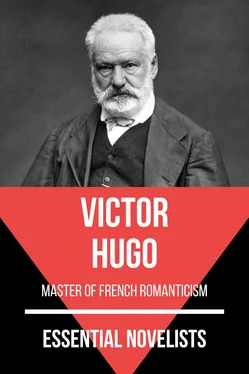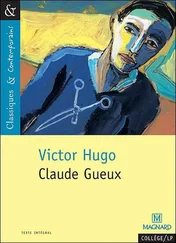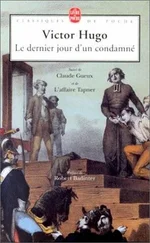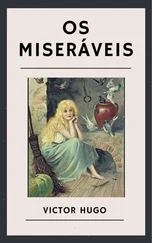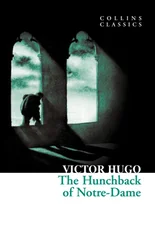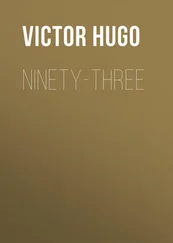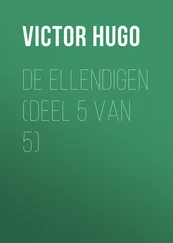“You see,” said the doctor, “how excited you become. So long as you are in this state I shall oppose your having your child. It is not enough to see her; it is necessary that you should live for her. When you are reasonable, I will bring her to you myself.”
The poor mother bowed her head.
“I beg your pardon, doctor, I really beg your pardon. Formerly I should never have spoken as I have just done; so many misfortunes have happened to me, that I sometimes do not know what I am saying. I understand you; you fear the emotion. I will wait as long as you like, but I swear to you that it would not have harmed me to see my daughter. I have been seeing her; I have not taken my eyes from her since yesterday evening. Do you know? If she were brought to me now, I should talk to her very gently. That is all. Is it not quite natural that I should desire to see my daughter, who has been brought to me expressly from Montfermeil? I am not angry. I know well that I am about to be happy. All night long I have seen white things, and persons who smiled at me. When Monsieur le Docteur pleases, he shall bring me Cosette. I have no longer any fever; I am well. I am perfectly conscious that there is nothing the matter with me any more; but I am going to behave as though I were ill, and not stir, to please these ladies here. When it is seen that I am very calm, they will say, ‘She must have her child.’”
M. Madeleine was sitting on a chair beside the bed. She turned towards him; she was making a visible effort to be calm and “very good,” as she expressed it in the feebleness of illness which resembles infancy, in order that, seeing her so peaceable, they might make no difficulty about bringing Cosette to her. But while she controlled herself she could not refrain from questioning M. Madeleine.
“Did you have a pleasant trip, Monsieur le Maire? Oh! how good you were to go and get her for me! Only tell me how she is. Did she stand the journey well? Alas! she will not recognize me. She must have forgotten me by this time, poor darling! Children have no memories. They are like birds. A child sees one thing to-day and another thing to-morrow, and thinks of nothing any longer. And did she have white linen? Did those Thénardiers keep her clean? How have they fed her? Oh! if you only knew how I have suffered, putting such questions as that to myself during all the time of my wretchedness. Now, it is all past. I am happy. Oh, how I should like to see her! Do you think her pretty, Monsieur le Maire? Is not my daughter beautiful? You must have been very cold in that diligence! Could she not be brought for just one little instant? She might be taken away directly afterwards. Tell me; you are the master; it could be so if you chose!”
He took her hand. “Cosette is beautiful,” he said, “Cosette is well. You shall see her soon; but calm yourself; you are talking with too much vivacity, and you are throwing your arms out from under the clothes, and that makes you cough.”
In fact, fits of coughing interrupted Fantine at nearly every word.
Fantine did not murmur; she feared that she had injured by her too passionate lamentations the confidence which she was desirous of inspiring, and she began to talk of indifferent things.
“Montfermeil is quite pretty, is it not? People go there on pleasure parties in summer. Are the Thénardiers prosperous? There are not many travellers in their parts. That inn of theirs is a sort of a cook-shop.”
M. Madeleine was still holding her hand, and gazing at her with anxiety; it was evident that he had come to tell her things before which his mind now hesitated. The doctor, having finished his visit, retired. Sister Simplice remained alone with them.
But in the midst of this pause Fantine exclaimed:—
“I hear her! mon Dieu, I hear her!”
She stretched out her arm to enjoin silence about her, held her breath, and began to listen with rapture.
There was a child playing in the yard—the child of the portress or of some work-woman. It was one of those accidents which are always occurring, and which seem to form a part of the mysterious stage-setting of mournful scenes. The child—a little girl—was going and coming, running to warm herself, laughing, singing at the top of her voice. Alas! in what are the plays of children not intermingled. It was this little girl whom Fantine heard singing.
“Oh!” she resumed, “it is my Cosette! I recognize her voice.”
The child retreated as it had come; the voice died away. Fantine listened for a while longer, then her face clouded over, and M. Madeleine heard her say, in a low voice: “How wicked that doctor is not to allow me to see my daughter! That man has an evil countenance, that he has.”
But the smiling background of her thoughts came to the front again. She continued to talk to herself, with her head resting on the pillow: “How happy we are going to be! We shall have a little garden the very first thing; M. Madeleine has promised it to me. My daughter will play in the garden. She must know her letters by this time. I will make her spell. She will run over the grass after butterflies. I will watch her. Then she will take her first communion. Ah! when will she take her first communion?”
She began to reckon on her fingers.
“One, two, three, four—she is seven years old. In five years she will have a white veil, and openwork stockings; she will look like a little woman. O my good sister, you do not know how foolish I become when I think of my daughter’s first communion!”
She began to laugh.
He had released Fantine’s hand. He listened to her words as one listens to the sighing of the breeze, with his eyes on the ground, his mind absorbed in reflection which had no bottom. All at once she ceased speaking, and this caused him to raise his head mechanically. Fantine had become terrible.
She no longer spoke, she no longer breathed; she had raised herself to a sitting posture, her thin shoulder emerged from her chemise; her face, which had been radiant but a moment before, was ghastly, and she seemed to have fixed her eyes, rendered large with terror, on something alarming at the other extremity of the room.
“Good God!” he exclaimed; “what ails you, Fantine?”
She made no reply; she did not remove her eyes from the object which she seemed to see. She removed one hand from his arm, and with the other made him a sign to look behind him.
He turned, and beheld Javert.
Chapter III
Javert Satisfied
––––––––
THIS IS WHAT HAD TAKEN place.
The half-hour after midnight had just struck when M. Madeleine quitted the Hall of Assizes in Arras. He regained his inn just in time to set out again by the mail-wagon, in which he had engaged his place. A little before six o’clock in the morning he had arrived at M. sur M., and his first care had been to post a letter to M. Laffitte, then to enter the infirmary and see Fantine.
However, he had hardly quitted the audience hall of the Court of Assizes, when the district-attorney, recovering from his first shock, had taken the word to deplore the mad deed of the honorable mayor of M. sur M., to declare that his convictions had not been in the least modified by that curious incident, which would be explained thereafter, and to demand, in the meantime, the condemnation of that Champmathieu, who was evidently the real Jean Valjean. The district-attorney’s persistence was visibly at variance with the sentiments of every one, of the public, of the court, and of the jury. The counsel for the defence had some difficulty in refuting this harangue and in establishing that, in consequence of the revelations of M. Madeleine, that is to say, of the real Jean Valjean, the aspect of the matter had been thoroughly altered, and that the jury had before their eyes now only an innocent man. Thence the lawyer had drawn some epiphonemas, not very fresh, unfortunately, upon judicial errors, etc., etc.; the President, in his summing up, had joined the counsel for the defence, and in a few minutes the jury had thrown Champmathieu out of the case.
Читать дальше
